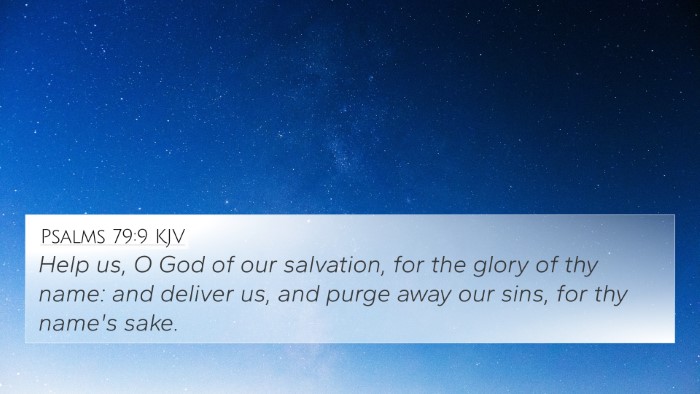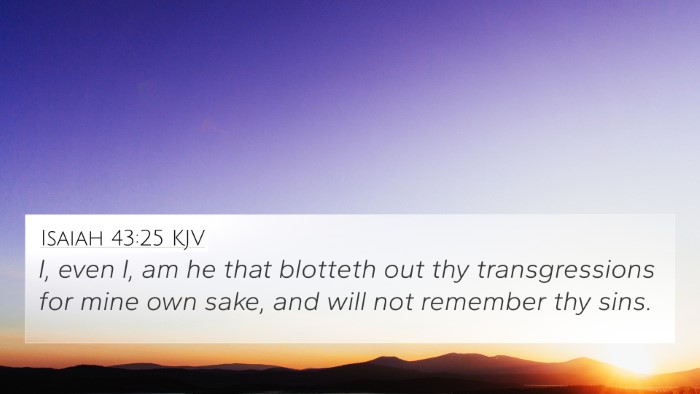Psalms 25:11 - Understanding and Interpretation
Bible Verse: Psalms 25:11
Verse Text: "For your name’s sake, O Lord, pardon my guilt, for it is great."
Overview of Psalms 25:11
Psalms 25:11 is a profound plea for mercy and forgiveness, emphasizing the character of God as a forgiving and compassionate being. This verse encapsulates the essence of penitence, as the psalmist acknowledges the severity of his guilt and appeals to God's nature rather than his own merits.
Commentary Insights
- Matthew Henry: Henry notes that the psalmist appeals to God's name, indicating that God's reputation for mercy is at stake in His forgiveness. This underscores the importance of God's holiness and compassion.
- Albert Barnes: Barnes emphasizes the acknowledgment of great guilt, suggesting that true repentance admits the depth of human sinfulness. He highlights the significance of seeking pardon for the Lord’s name’s sake, which reflects a deeper motivation than mere personal benefit.
- Adam Clarke: Clarke stresses the gravity of the psalmist's situation, noting that the plea for pardon is not just for the individual but is tied to God's character. He interprets this verse as a profound reminder of the necessity of divine grace for salvation.
Thematic Connections
In exploring connections between Bible verses, Psalms 25:11 resonates with various themes found throughout Scripture. This declaration of guilt and a cry for forgiveness connects to numerous passages that emphasize God’s mercy and the nature of sin.
Related Scriptures
- Psalms 51:1-2: A penitential psalm pleading for mercy and cleansing from sin.
- Isaiah 43:25: God’s declaration of forgiveness for His people, emphasizing His intent to forget sins.
- 1 John 1:9: Promise of forgiveness if we confess our sins.
- Romans 5:20: Where sin increased, grace abounded all the more, demonstrating God’s surpassing mercy.
- Luke 18:13: The tax collector’s cry for mercy illustrates the humility essential for receiving pardon.
- Acts 2:38: The call to repentance and baptism for forgiveness of sins.
- Hebrews 4:16: Encouragement to approach God’s throne of grace with confidence to receive mercy.
Inter-Biblical Dialogue
This verse opens avenues for cross-referencing Biblical texts. The acknowledgment of guilt leads to a broader understanding of Biblical themes such as grace, mercy, repentance, and the nature of God. Each of these themes contributes to a richer understanding of how Scripture dialogues with itself across different contexts.
Tools for Cross-Referencing
To deepen your study of Psalms 25:11 and its connections, consider utilizing Bible reference resources:
- Bible concordances help identify keywords and themes across the text.
- Bible cross-reference guides are excellent for exploring related passages.
- Cross-reference Bible studies can provide structured insights into thematic connections.
Conclusion
Psalms 25:11 serves as a powerful reminder of the need for divine grace in light of human sin. By recognizing our great need for forgiveness, we are invited into a deeper relationship with God, who acts out of His loving nature. Exploring this verse in context with related Scriptures enhances our understanding of the mercy inherent in God’s character and encourages us to seek His forgiveness.
Keywords and Search Intent
This analysis includes key phrases such as:
- Bible verses that relate to each other
- Connecting Bible verses for deeper meaning
- Cross-referencing Psalms with New Testament teachings
- Comparative Bible verse analysis of forgiveness themes
Further Study Suggestions
For those wishing to study further:
- Explore how different passages in the Old Testament and New Testament echo this theme of repentance and forgiveness.
- Identify how these themes play out in the lives of Biblical characters, enhancing the narrative of grace throughout Scripture.
- Utilize comprehensive Bible cross-reference materials to locate similar themes across various genres of scripture, including the Gospels and Epistles.














